|
|
| |
| EVENTS |
|
|
> Parliament urged to formulate comprehensive defence and security policies
|
|
|
|
| |
Islamabad; May 10: At a PILDAT Roundtable Discussion on the issue of Parliament and National Security, organised in the backdrop of PILDAT report on the Performance of the Parliamentary Committees of Defence and the National Security during the first 3 years of the 13th National Assembly of Pakistan, experts were of the opinion that the Parliament should fully use its mandate and constitutional powers to oversee the Defence and National Security Sector. Syed Talat Hussain, senior analyst, while discussing the issue, said that the PILDAT report highlights that the committee system has the essential powers to work effectively but those powers need to be put to a more effective use. �Parliamentarians have the authority, to hold government and state�s security apparatus to account, if there is political will,� he said. Public representatives have never discussed in detail the parameters of defence and security policies, it appears. There is no internal debate inside political parties about defence and security issues. He questioned the capabilities and focus of parliamentarians even in areas other than security and defence which are under their domain. |
|
| |
Other speakers at the roundtable included Ms. Shagufta Sadiq, MNA, Member National Assembly Standing Committee on Defence, Mr. Amir Ali Magsi, MNA, Member National Assembly Standing Committee on Defence and Lt. Gen. (Retd.) Talat Masood, defence analyst and former Federal Secretary Defence Production.
|
|
| |
The discussion was joined by well-known analysts from academia, media, political parties, members of Parliament and non-government institutions. While there was a consensus at the forum that Parliament and political government lack the political will to hold security and defence sector to account, many also raised issues such as reluctance of the security establishment as the key reason, to be called to account. There was agreement that challenging as it is, the background of the killing of Osama Bin Laden on our sovereign soil and security lapses offers a crucial opportunity for internal debate, soul searching and possibility of apportioning responsibility and exercising civilian and democratic control on the defence sector. There was also agreement that until Parliament asks the exact details of Pakistan�s written or agreed understanding of cooperation with the United States, a meaningful contribution towards developing a national paradigm on national security is not possible. |
|
| |
Ms. Shagufa Sadiq, MNA, member National Assembly Standing Committee on defence, said that defence standing committee is not only looking into defence matters but also other related issues like PIA or CAA. She said that institutions should be strengthened, and not only defence but all parliamentary committees and Parliament should be empowered. She believed that public representatives should be taken into confidence on national security issues. |
|
| |
Lt. Gen. (Retd.) Talat Masood, was of the view that defence committees can only be effective if Parliament and civilian government have the knowledge and expertise. He believed that if militaryt wants to defend the country, it can only do so in a strengthened democracy. He said that many power centres have emerged in the country which is quite harmful. He stressed the need of accountability especially in the defence sector which could only be achieved if civilians have the political will to exercise their constitutional rights of overseeing all sectors of state including defence. |
|
| |
Mr. Aamir Ali Khan Magsi, MNA, said that Committees have wide powers to summon any person or documents. He believed there is progress on establishing and exercising Parliamentary control on defence, though it is a slow process. Parliament needs to ask questions from security agencies on the failure of detecting Osama Bin Laden. |
|
| |
Senator Dr. Abdul Malik, Chairman National Party, believed that political parties mostly compromise on defence and foreign policy when they come into power. He stressed that there is a dire need to change Pakistan from a security state into a welfare state. Our entire foreign policy, especially the Afghan policy, should be revisited. |
|
| |
Ms. Fouzia Ejaz Khan, MNA, MQM was of the view that Parliamentarians can do anything but they do not have the will to do so. |
|
| |
Participants appreciated PILDAT for its efforts in the compilation of the report and organizing discussion on such significant issues. They were of the view that the Osama Bin Laden�s existence in Pakistan is a big failure of security agencies and the military should provide answers to the public on this failure. They said that the problem lies within the political parties which lack basic systems and focus on policies. Parliamentarians have no say in budget making, defence or foreign policy. Experts believed that broad national paradigm is missing in policy making, Parliament and Government should develop a new security policy and renegotiate the security cooperation with USA. They stressed that multiple centres of power should be replaced with one rightful institution of Parliament that should lead the policy debate inside Pakistan
Earlier, Ms. Aasiya Riaz, Joint Director, PILDAT gave presentation on the main points of PILDAT report. She said that PILDAT had produced reports on overall performance of Parliament and this is first report of its kind in Pakistan in which the publicly available data of the defence and security-related committees has been used. She said that the purpose of this report is not to criticize the performance but to strengthen the role of parliamentary oversight on defence and security sector. The absence of Parliamentary leadership in defining policy and overseeing its implementation is most stark is the present national security scenario. One is hard pressed to find any contribution or any role played by Parliamentary committees in any major security decision taken by the country. Both Parliament and the Government do not seem prepared to be in the forefront of defining what constitutes a national security strategy of Pakistan in dealing with this war that has no end in sight. The elected leadership of the people continues to abdicate its responsibility of leading the essential dialogue that can help define a winning and lasting strategy.
The PILDAT report on Performance of the Parliamentary Committees of Defence and the National Security during the first 3 years of the 13th National Assembly of Pakistan together with a Background Paper on Parliamentary Oversight of Defence in Pakistan: The Way Forward, authored by Mr. Sartaj Aziz, former Senator and Federal Minister of Pakistan, are being released to today. |
|
| |
|
|
| |

|
|
| |
|
|
| |
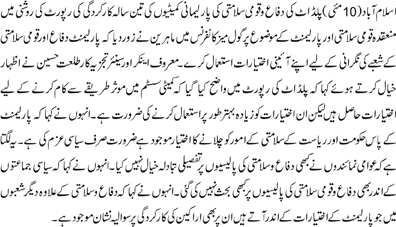
|
|
| |
|
|
| |

|
|
| |
|
|
| |
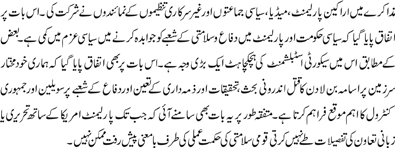
|
|
| |
|
|
| |

|
|
| |
|
|
| |

|
|
| |
|
|
| |

|
|
| |
|
|
| |

|
|
| |
|
|
| |
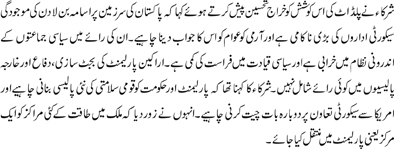
|
|
| |
|
|
| |
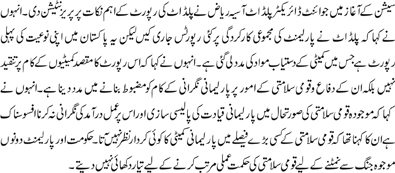
|
|
| |
|
|
| |

|
|
| |
|
|
| |
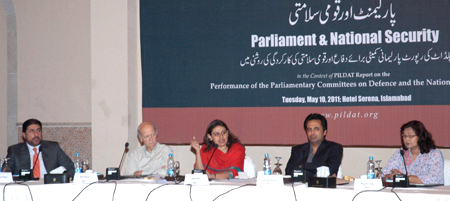
|
|
| |
|
|
| |

|
|
| |
|
|
| |

|
|
|
|
|
|
|
|
|